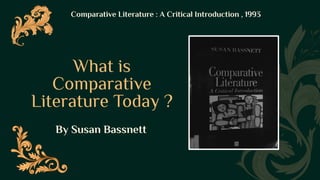Susan Bassnett describes how comparative literature has evolved over time. It challenges Eurocentric approaches and embraces more inclusive understanding of diverse literatures. Bassnett reviews comparative literature in the 1990s, noting how developments in critical theory have impacted the field. She views translation as crucial for cross-cultural understanding and questions comparative literature's current state and future. Bassnett argues the field must adapt to new technologies and globalization while resisting cultural homogenization by promoting nuanced understanding of different literary traditions.


















